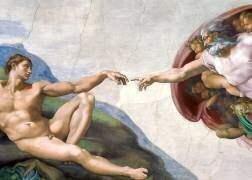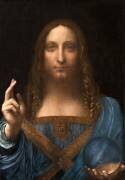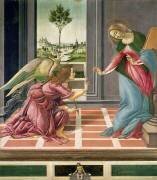Subjects: ReligionKeywords: Apostle, Bible, Italy, Renaissance, Roman, Rome, Saint Peter, chapel, dome, key, perspective, religion, saint, saint, temple, triumphal arch(Ref : 364125) © Bridgeman Images
Customise
Your art print
Giving of the Keys to St Peter OF Il Perugino
The artwork
Giving of the Keys to St Peter
The Handing over of the Keys to Saint Peter (Italian: Consegna delle chiavi) is a fresco with a religious theme by Perugino and his assistants, dating from around 1482 and forming part of the decoration of the middle register of the Sistine Chapel in the Vatican.
In 1480, Perugino, who was frescoing a chapel for Pope Sixtus IV in the ancient Vatican Basilica, was so successful that he was immediately commissioned to decorate the new papal chapel, later called the "Sistine" in honour of the pope.
In this undertaking, he was assisted by a team of Florentine painters, specially sent by Lorenzo de' Medici.
Perugino, with the many helpers (including the young Pinturicchio) that such a work required, painted at least six scenes, of which only three remain today.
Andrea d'Assisi (known as l'Ingegno), Rocco Zoppo, Lo Spagna and Bartolomeo della Gatta are among Perugino's collaborators mentioned by Giorgio Vasari.
The work belongs to the traditional Christian iconography of the Traditio clavium ("Handing over of the Keys"). The theme refers to a phrase in the Gospel of Matthew (Mt 16:19), in the New Testament, and is an allegory of Petrine primacy.
The scene brings together Saint Peter and Jesus of Nazareth in the presence of the other apostles: Jesus hands over two keys to Peter, a golden key and a silver key, one for the salvation of souls, the other for paradise.
The scene brings together a large crowd in the foreground of the composition, centred on Jesus standing and handing [...]
This artwork is a painting from the renaissance period. It belongs to the italian renaissance style.
Find the full description of Giving of the Keys to St Peter by Il Perugino on Wikipedia.



































